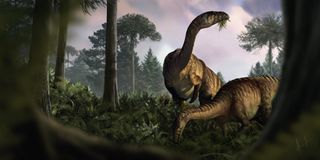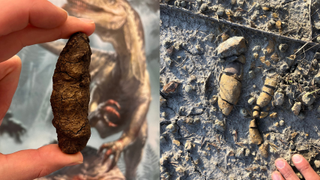
Scientists have made a breakthrough in understanding how the dinosaurs rose to power — by studying dino puke and poop.
The findings, published Nov. 27 in the journal Nature, offer new insights into the diets of these prehistoric powerhouses, revealing clues into how they squeezed out their competition.
"Diet and ecology are important factors shaping the evolution of animals today and in the past," study co-author Martin Qvarnström, an evolutionary biologist at Uppsala University in Sweden, told Live Science in an email. "Just analyzing bone remains won't cut it if we want to understand the rise of dinosaurs."
The earliest evidence of dinosaurs in the fossil record dates to the mid-Triassic period (247 million to 237 million years ago). However, it took another 40 million years — into the early Jurassic period — for them to take over the world. During this time, the dinosaurs displaced many of the other large land animals — but exactly how they did this remains a mystery.
To find out more, the study authors analyzed more than 500 fossilized remains from the Polish Basin, spanning the late Triassic to the early Jurassic.
But they weren't interested in the dinosaurs' bones. Instead, they looked at the dinos' fossilized vomit and poop — known as regurgitalites and coprolites, respectively. These can provide vital information on the diet, feeding behavior, physiology and parasites of the creatures they came from, Qvarnström said.
They also enable scientists to compare these dinosaurs' diets to those of other animals from the period and track how they changed over time.
Related: Rare fossilized vomit discovered in Utah's 'Jurassic salad bar'
Qvarnström said that he was really excited about the variety of different foods that were found in these fossils. "We have seen everything from tiny beetles to half-complete fish, bones, teeth, and plant remains," he said.

The fossilized vomit yielded particularly fascinating finds, study co-author Grzegorz Niedźwiedzki, a paleontologist at Uppsala University, said.
"We found a piece of a temnospondyl amphibian skull [prehistoric creatures that looked like giant toads,]" Niedźwiedzki told Live Science in an email. "No one would have guessed that such massive temnopsondyls were attractive to predators. It was honestly easy to break your teeth on such a massive skull."
Another piece of puke contained the bones of a small crocodile.
By combining their findings with historical climate and plant data, the team reconstructed these prehistoric food webs and tracked how they changed over time. One defining feature of the dinosaur diets was the diversity of different foods that they consumed, enabling them to adapt to their changing environment. This put them ahead of their more specialized competitors, especially when times were tough.
Because they weren't picky eaters, plant-eating dinosaurs may have also been able to grow much larger, allowing the evolution of larger carnivores.
Lawrence Tanner, a professor of environmental science systems at Le Moyne College in New York state who published a commentary on the new study, added that the reconstruction also suggests dino domination took place in stages through the late Triassic and wasn't "the result of any single catastrophic event."
The researchers hope to expand their research to other parts of the world to confirm their findings and learn more about dinosaur diets. "There is still a lot to be explored," Niedźwiedzki said.


评论(0)